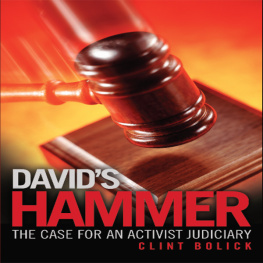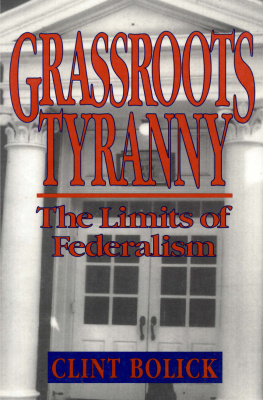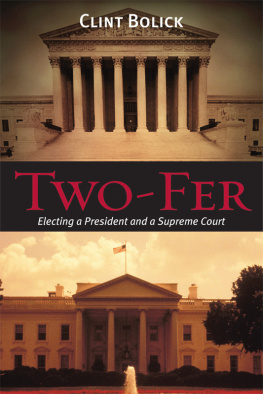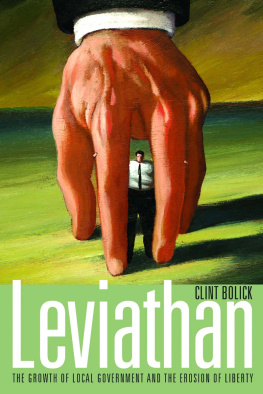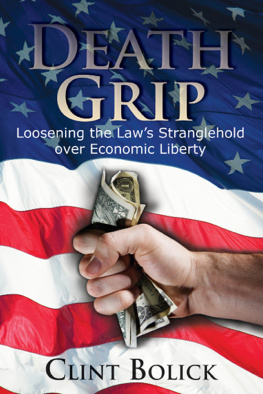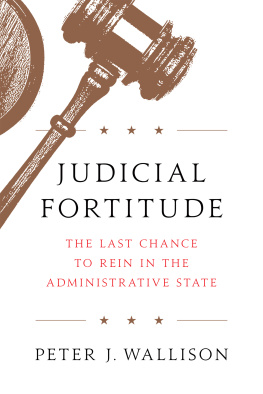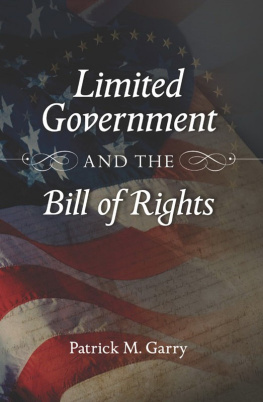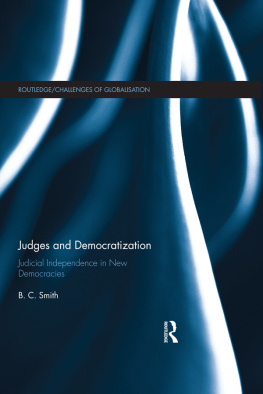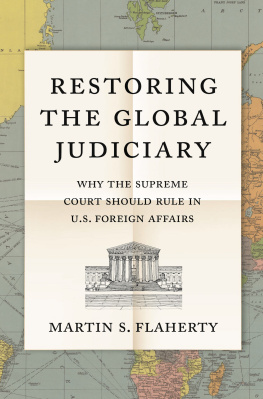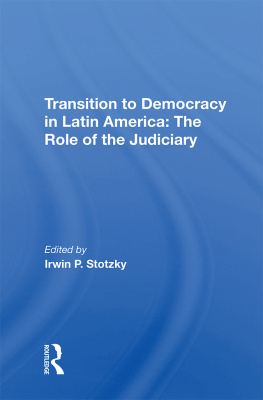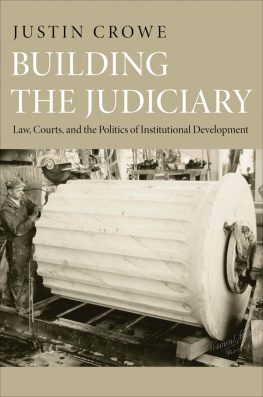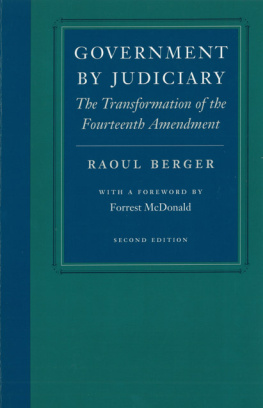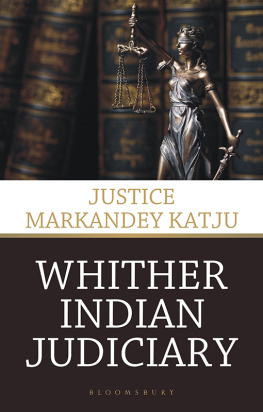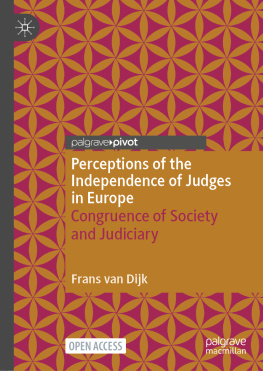The Cato Institute gratefully acknowledges the generous contribution of Steve G. Stevanovich to the production of this book.
Copyright 2007 by Cato Institute.
All rights reserved.
Library of Congress Cataloging-in-Publication Data
Bolick, Clint.
Davids hammer : the case for an activist judiciary / Clint Bolick.
p. cm.
Includes bibliographical references and index.
ISBN 978-1-933995-03-8 (cloth : alk. paper)
ISBN 978-1-933995-02-1 (paper : alk. paper)
1. Political questions and judicial powerUnited States. I. Title.
KF384.B58 2007
347.731dc22
2007060887
Cover design by Jon Meyers.
Printed in the United States of America.
CATO INSTITUTE
1000 Massachusetts Ave., N.W.
Washington, D.C. 20001
www.cato.org
Foreword
I suspect that a lot of people will see the subtitle of this book and instinctively decide that they disagree with what is inside (although I hope it will prompt them to pick up the book and read it). That is because judicial activism today is the universal pejorative, the one thing that liberals and conservatives agree is wrong, even if they disagree over what it is.
Who on Earth possibly could stand up for judicial activism? The moniker conjures images of imperious jurists in marble temples sitting in judgment on matters rightly consigned to democratic processes, bereft of constitutional constraint and subject only to their own hubristic whims.
Indeed, over the past 75 years or so, we have seen abundant examples of precisely that type of judicial arrogance, in which judges literally invent new constitutional or statutory rights out of thin air, exercise sweeping powers that belong to other branches of government, and act as if completely unbound to any type of constitutional moorings. Such examples of judicial activismor, more accurately, as my friend Gene Meyer suggests, judicial lawlessnessdeserve contempt, for they do extreme damage to the integrity of the judiciary and to the rule of law that undergirds a free society.
But increasingly, many today on both the right and the left define judicial activism in simpler terms, as the act of courts striking down laws enacted by the democratic branches. Thus defined, and still cast in a pejorative manner, the term suggests that courts ought routinely to defer to the elected branches of government (or, for that matter, to the many unelected officials who actually create and apply most of the laws and regulations that govern us today).
To the notion, clothed in that conventional wisdom, that judges ought to defer to the elected branches of government, this book posits two questions: why and to what effect? Americans do not live in a pure democracy where the majority rules, much less where powerful and highly motivated special interests are entitled to manipulate government powers to their own ends. We live in a constitutional republic. The overarching principle of our system of government is that all of its constituentsthe executive, legislative, and judicial branches as well as the people themselvesare bound by the Constitution. The primary goal of that Constitution is to protect freedom. And within that system, for better or worse, the courts are assigned the role of keeping the other branches of government within the assigned limits of their constitutional powers.
Given the explosive growth of government at every level and the resulting erosion of freedom, the problem with judicial activism thus defined is not too much of it but too little. In assessing the constitutionality of laws and regulations, regardless how oppressive, the courts indulge a presumption of constitutionality. Through procedural rules, they have judged many laws and regulations to be essentially nonreviewable. Worst of all, they have excised from our Constitution precious liberties and limitations on government power that the founders rightly believed were essential to American liberty.
Im biased. I have spent most of my career challenging government laws and regulations in court. I chose the courts in which to operate for two principal reasons: in the courts an advocate can achieve outcomes that are painted in black and white, rather than shades of gray; and courts are a forum in which the proverbial David can, and often does, defeat Goliath (hence the title of the book). My cases (many of which are described in the pages that follow) have involved real people fighting for their rights against oppressive government. Typically, those people cannot vindicate their rights in the political arena, where the odds simply are too stacked against the little guy. But they often can and do win in court, because the judicial mandate, properly construed, is to apply the rule of law to the facts without regard to the resources or political clout of the litigants.
I hope that in the following pages I can convince readers that judicial protection of individual rights exists not too much but far too little, and moreover, that judges can and should be bound by a set of principles that would prevent judicial lawlessness while still allowing the courts to carry out their vital role of safeguarding freedom.
Along the way, I write about both judicial misadventures and triumphs. I begin with one of my own cases, which challenged regulatory barriers to interstate shipment of wine to consumers, and which sparked a spirited debate (no pun intended) over the proper exercise of judicial authority. I then turn to arguments made by critics of judicial activism on both the right and the left, some of which are valid and others that would eviscerate the vital role of the judiciary in the protection of individual liberty. From there I address what the Constitutions Framers had in mind when they created a federal judiciary, and I trace the uneven record of the U.S. Supreme Court in fulfilling its intended role, emphasizing the Warren and Rehnquist Courts. Through cases affecting individual rights and the limits of government power, I examine the sharply varying real-world implications of courts that take their constitutional duties seriously and those that do not. I end by exploring briefly the largely untapped potential of state courts in interpreting their own constitutions to protect individual liberty and constrain government power.
I have focused mainly on domestic constitutional issues. Two important areas I have not covered extensively because of my lack of expertise are criminal law and national security, the latter of which has become increasingly important after the terrorist attacks on September 11, 2001. Those issues concern me greatly, but I leave it to others to flesh out the proper boundaries of judicial intervention in those areas. As my discussion of wartime powers during World War II indicates, however, I do not believe that constitutional liberties should be suspended in time of war, which is when they often are most tested. Such concerns are particularly implicated when the war is undeclared and waged against largely unknown foes for an uncertain duration. Had I included criminal and national security issues, I suspect that some of the justices who in my analysis do not fare well on other issues might fare better overall, and vice versa. The ideal judge, however, is one who broadly interprets both constitutional liberties and limits on government power, regardless of the context.
I am enormously grateful to the Cato Institute for publishing this book and especially to David Boaz, Bob Levy, and Roger Pilon for their excellent editing and enthusiasm for the project. I am appreciative as well to my former colleagues at the Institute for Justice for their support, good work, and inspiration and to my clients over the years for their heroism. After three years as president and general counsel of the Alliance for School Choice, I am returning to the vineyards of litigation (metaphor intended), and this book sketches a bit of what I hope is the realm of the possible for a freedom-oriented litigation practice. In the meantime, I hope this book will spark debate that focuses less on overheated, partisan rhetoric and more on the nature and role of the institutions that are necessary to preserve freedom in our great nation.

